An Update on Afghanistan and the Grim Future of Taliban Rule

Concrete Barrier at the Kabul Airport
September 14, 2021
As of August 30, 2021 at 11:59 local time, the last U.S. plane lifted off the ground in Kabul. Minutes later, members of theTaliban fired celebratory gunshots into the air. This is the first time the U.S. has not had boots on the ground in Afghanistan since the war started 20 years ago, and over the span of two decades, over 2,400 U.S. military personnel and 50,000 Afghan citizens lost their lives to the war.
This quick departure came a day earlier than expected (the white house citing safety concerns), and over 100,000 eligible Afghans and Americans were not able to be evacuated in time. The Taliban has pledged that they will let citizens as well as non-citizens depart the country as they please, but when this will happen is uncertain.
This comes after an attack on August 26 by ISIS-K at the Kabul airport, killing more than 100 people including at least 13 U.S. service members. After the threat ISIS-K posed was presented to the U.S., a retaliatory drone strike on an ISIS-K vehicle was made less than 72 hours later. This drone strike, however, is rumored to have killed 10 Afghan civilians all belonging to the same family; seven of them being children, and two who work with American military/charity. Keep in mind, this report has not been verified.
All of this leaves the question: Now that evacuations have ended, what will happen to those left behind? People living in rural parts of Afghanistan who don’t have electronics or internet connection were not able to ask for help in the first place. However, groups like UNESCO are committed to staying and providing assistance to people in need.

Anyone born in Afghanistan belonging to Gen Z probably doesn’t even remember what life under Taliban rule was like. Since the Taliban fell in 2001, literacy rates among women have grown to 50%, and the number of young people becoming artists and craftsmen has increased dramatically. In recent years, more than ¼ of Afghan parliamentary seats were reserved for women- that’s more than the U.S.! For these young people, going back to the Taliban era rules that ban things as simple as music is an unreal and dangerous prospect.
These notions are very real for 24 year-old Behishta Arghand– a leading broadcast journalist native to Afghanistan. On August 17, Arghand took a last-minute interview with a high-ranking member of the Taliban on live T.V. In this interview, she openly challenged his ideas, which as a woman, put her in grave danger. Days later, she fled the country.
Along with Arghand, almost all other foreign media was evacuated in the following days, as well as Afghan people working in conjunction with foreign media. At this point, there is no free press remaining in Afghanistan. Some say this lack of transparency will mark the beginning of a humanitarian crisis.
Despite all of this, the Taliban has claimed they will provide more freedoms to women and girls. They have also made promises to respect cultural/heritage sites, and the Aga Khan
Trust did reopen. Do the people living under their rule believe them? Some are cautiously optimistic. Others don’t. Rada Akbar, an artist and activist based in Kabul, recently found out she is on an assassination list that the Taliban has had for over 20 years. “People must be so naive to trust that they have changed”, she says. Since the Taliban reached Kabul, women shopping alone in markets have been told to return to male guardians. Female students/teachers have also not been allowed to enter the University at Herat.
Since the takeover began, the Taliban has made many statements ranging from promises of freedom to old rules that will be implemented. However, one statement stands out among the rest: “We forgive every Afghan”. After the dust settles, and the story has sank off the front page of the news, this statement will be what is left for the people remaining in the country. Although the news of the past weeks has been shocking, there is much more to come.

